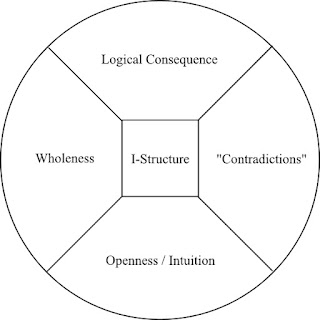Can we trace back consciousness, reality, awareness, and free will to a single basic structure without giving up any of them? This dialogue founds consciousness and freedom of choice on the basis of a new reality concept that also includes the infinite as far as we understand it. Just the simplest distinction contains consciousness. It is not static, but a constant alternation of perspectives. From its entirety and movement, however, there arises a freedom of choice being more than reinterpreted necessity and unpredictability. The unity and openness of the infinite enables the individual to be creative while this creativity directly and indirectly enters into all other individuals without impeding them.
Great Read. Thank you for putting your work out into a conscious space
for all. Much appreciated.
Marcel P. Londt, PhD, South Africa
Read online (90%)
Order the Book
Order the Book
Also in this book:
The Reality of Free Will
The uniqueness of each standpoint, each point of effect, can only be "overcome" by the standpoint changing to other standpoints and returning. In such alternation, which can also appear as constant change, lies the unity of the world. The wholeness of an alternation, however, is a structure of consciousness due to the special relationship between the circumscribing periphery and the infinitesimal center. This process structure unites determinacy and indeterminacy also totally in every place. Therefore, everywhere we are dealing with forms of consciousness with more or less freedom of choice and an increasingly unknown depth. We live in a world of choosing consciousness, or rather awareness. In this respect, our environment expresses a deep truth about ourselves.
I am impressed by the comprehensiveness of your interdisciplinary
approach. There are some major philosophical concepts which you weave
very well into a necessary system of reality: potential, the one and the
many, alternation, constant change, the reality and uniqueness of
oneiric experience and the whole, interdependence, infinity, the mandate
of opposites and many more. The combination of these ideas cannot be
attributed solely to any other of the established classical and modern
thinkers of whom I am aware. I thank you for your enlightenment.
E W Ralph, UK
Your important book entitled 'Alternating Consciousness' is very
significative for our project involving creativity and social innovation
research.
Professor Flàvio Filho, Brasil
A must read for those who want enlightenment on consciousness.
Ejiro Imuere, Nigeria
Great publication. Really contributed to my knowledge.
A. Kumar, India
(Reader comments apply to the main part Dialogue on Alternating Consciousness.)
Table of Contents
The Reality of Free Will
Individuality and Reality
What is Consciousness? (I)
How is Freedom of Choice Possible?
What is Awareness? (I)
The Reality Funnel – What is Consciousness? (II)
All That Is – What is Awareness? (II)
Subconscious – Free or Not?
Probability Thinking
Is There a Constant Reality?
Truth, Harmony, and Free Will
Dialogue on Alternating Consciousness
Day 1: What is a Consciousness Unit?
Day 2: Choices Everywhere
Day 3: Awareness in Alternation
Day 4: The Unlimited Potential
Day 5: Indestructible
Day 6: All-Encompassing Creativity
Day 7: Free Will
Why not?
My explanation for why no one has yet proposed an i-structure (infinitesimality structure) is that this basically simple concept of reality presupposes a combination of four seemingly very different perspectives. Known approaches combine at most two of them, but largely ignore the others. However, if all four are considered equally, elementary philosophical problems such as those of free will, the particularity of consciousness ('qualia'), and the relation to the other (intersubjectivity) almost solve themselves.

